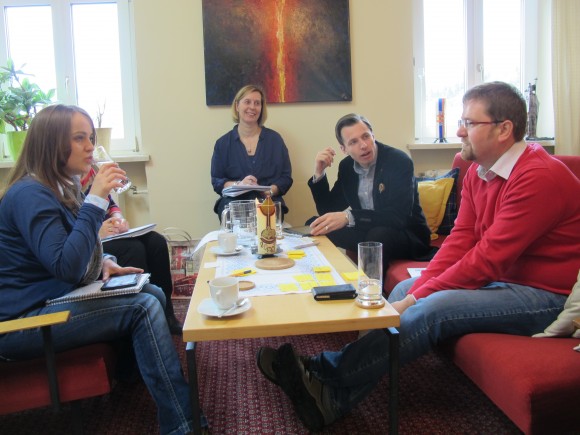Sprachen
The resignation of Pope Benedict XVI raises more questions than ever about the future of the Church. Where will the new Pope lead the faithful? Will conservatives or reformers determine the course of the church and what does that mean for the individual church members? Will the church stand behind the supporters of the Austrian Priest Initiative in making required reforms, or will the future bring a true split among the clergy: on one side the innovators who insist on structural reforms, and on the other the traditional who are predominately concerned with a “respiritualization” of the believers.
“All the whispering is driving me crazy,” says Max Tödtling (43), Dean of Leoben and a member of the Priest Initiative: “Those are all just marginal problems, says the church leadership, we should rather talk more about Jesus. Well if that is the case, then why are we spending so much time dealing with these marginal problems instead of simply solving them so that we can focus on what's truly important?” Tödtling refers to the Second Vatican Council when he says that it would actually be his duty as a priest to point out grievances: “We as priests are worried and are simply saying: We can’t go on like this.”
Dechant Tödling is one of those very busy priests in Austria. He is responsible for four parishes in Leoben: Hinterberg, Göss, Donawitz and Waasen, and a total of 12,500 churchgoers. Together with a chaplain and his “team”, he tries between his many appointments not to forget the “people” and to be there for each and every one of them. For him, working with the people is what it is all about. To be a human being first, and to embody the Office second. To create a balance every day between the regulations of the official church and dealing with the concerns, needs and failures of the individual believers in the community.
The film portrays the classic situation of the “church now”: larger and larger priest organizations, priest shortages, members leaving the church and a dwindling interest, not only on the part of young people, but throughout the entire Catholic community. In Leoben, Tödtling sees himself as still facing the traditional anti-religious environment of a working-class town. “In the past, if someone made a name for themselves in the industry in Leoben, out of gratitude they would immediately leave the church,” he says, or with his typical sense of humor: “The people from Upper Styria are particularly good Christians. They do everything they can to preserve their churches.”
Broadcast date: March 12th, 2013, 10:30 p.m. ORF 2
Duration: 30 min.,
Design: Thomas Grusch and Elizabeth Krimbacher
A production for ORF




